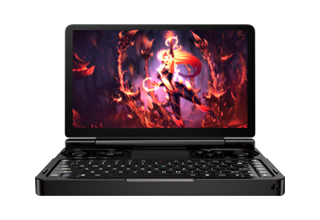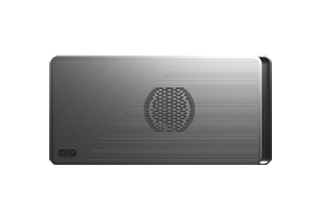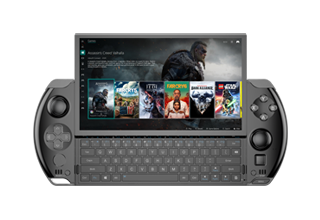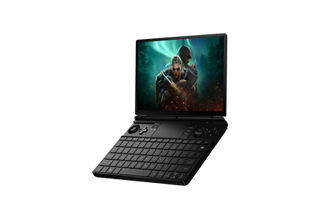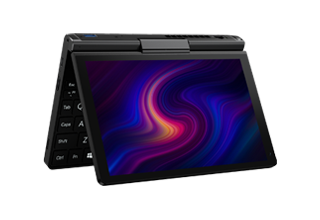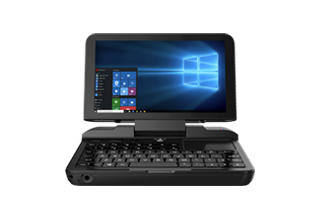New GPD DUO released! Screen chapter

We mainly make handhelds, but we always focus on the field of productivity! We have found that more and more designers or developers use dual-screen office, but it is not portable. Although there are dual-screen monitors on the market, such as the following products, they are separated from the host and are not easy to carry.
 |
 |
On the other hand, products that combine the screen and the host into a dual-screen obviously go against market demand. For example, the two products below, one is a dual-screen from a certain brand, and the other is a dual-screen from a certain thought, both of which adopt a split design and require an external Bluetooth keyboard.
 |
 |
The idea of integrating the screen and the fuselage into a dual-screen product obviously goes against market demand. For example, the two products below, one is a dual-screen from a certain brand, and the other is a dual-screen from a certain thought, both of which adopt a split design and require an external Bluetooth keyboard.
The idea of integrating the screen and the body comes from the tablet, and the idea of dual screens comes from the folding screen mobile phone, but CPUs such as 185H and 1355U are made into tablets, and then another screen is added, and it must be ultra-thin, then only the heat dissipation and performance can be sacrificed, not to mention wasting a U, how weak it is to be a productivity tool, and anyone who has used it knows it.
We want to make products that truly meet user needs!
First of all, it must be an integrated design, and the keyboard must not be separated from the body. Bluetooth, wireless mouse and keyboard are all rubbish without exception, and the worst wired mouse and keyboard set is hundreds of times better than them. The virtual keyboard is just an expedient measure to deal with simple work. No one will really believe that a tablet + keyboard or a mobile phone + WeChat is equal to a productivity tool!
Secondly, its performance release must be maximized, the hardware potential must be fully tapped, and the performance must be maximized, whether it is gaming or office work, it can be benchmarked against gaming laptops!
Thirdly, it must use the best OLED screen, and it must be a dual screen; it must have e-sports-grade response speed; it must be a native 10bit screen, achieving 100% Adobe RGB color gamut coverage, meeting the professional needs of the design field; it must have pressure-sensitive function and original handwriting writing, to ensure a more refined drawing effect to replace the drawing board!
Fourthly, it must have a full-featured port and the strongest scalability, and can be connected to an independent graphics card!
Fifth, it must support at least 2 M.2 ports. When choosing the largest capacity SSD on the retail market, ensure that the body storage can be expanded to 8TB or 16TB! Its maximum memory may reach 96GB, in order to create a cross-platform development environment with multiple systems and multiple IDEs running for virtual machine users!
Sixth, it must have a battery life that is not inferior to any current high-end thin and light notebook!
Seventh, it must be portable, only the size of an A4 paper, girls can carry it with a single-shoulder bag, and it can be carried with you and work anytime, anywhere!
Eighth, as an AI PC, it must have powerful computing power, storage capacity and multimodal interaction capabilities!
Finally, it must be able to adapt to various scenarios, and not just limit itself to a laptop! For example, the secondary screen can be connected to a third-party main device for office work, gaming, and experience Linux or macOS in tablet mode!
This is GPD DUO, a dual 13.3-inch screen productivity laptop that engineers are most likely to love.

GPD DUO uses a 13.3-inch dual AM-OLED screen, Samsung original OLED panel, 10bit color depth, 1.07 billion colors bring amazing picture quality, its extremely high contrast ratio and close to 0 nits of black, bringing more Vivid, vivid and realistic picture effects.
The correct way to open

Screen Chapter
Dual 13.3-inch Aurora AM-OLED full screen, dual screen unfolded with a visible area of 18 inches. The display ratio is 16:10, the resolution is 2880 × 1800, which is equivalent to the screen resolution of 4 1440 × 900, the pixel density (RGB) is 255 PPI, supports 60Hz refresh rate, supports 10-point touch, supports handwriting, supports 4096-level pressure-sensitive pen, MPP protocol, compatible with Surface Pen stylus.


In terms of color gamut, 100% Adobe RGB and 133% sRGB color gamut coverage are suitable for professional design fields and are also rigid requirements for designers. The 100% Adobe RGB color gamut is close to the color range used in traditional printing and photography. The wider the color gamut, the more colors and details, and the higher the color accuracy and precision. GPD DUO fully meets this requirement!
For office users, 133% sRGB is already super-equipped. Whether it is delicate color gradation or bright color contrast, GPD DUO's screen can present it perfectly.

Another advantage of GPD DUO's OELD screen is that it is natively 10bit, presenting 1.07 billion colors.

The color level difference between a 10bit display and an 8bit display is 4 times, and the color accuracy is also 4 times worse. The native 10bit screen has richer colors and smoother transitions, and there are few ripples like the left side of the picture above. Although the 8-shake-10 LCD panel can also achieve 1.07 billion colors, there will be slight flicker and noise on the surface.

GPD DUO's screen achieves 100% DCI-P3 cinema-grade ultra-wide color gamut coverage, allowing more color details to be presented when watching movies. As a TV format standard, 96% of NTSC wide color gamut coverage exceeds the international color gamut 92% NTSC standard. When choosing to watch TV programs in NTSC format in the software, the colors will be richer.
The screen of GPD DUO will be calibrated individually before leaving the factory to ensure that Delta E < 1, ensuring the color accuracy and consistency of the screen of each device, and there is an exclusive ICC file, professional film-level color accuracy performance.

The biggest advantage of OELD screen over LCD screen is its self-luminous pixel design and extremely high contrast ratio. Each pixel can independently control the light source to turn on or off. Therefore, it has an extremely high contrast ratio of 1,000,000:1, capable of presenting true black and bright white.

When watching a movie, you can clearly feel that the dark places in the image are darker, while the bright places are brighter and whiter. Compared with the LCD screen, the picture has obvious layering and transparency. For example:

The black part is actually the light source of the pixel turned off, and it can present a true black close to 0 nits. This is something LCD can't do.

By adjusting the background of the display to black, you can see the difference between the two. OLED will turn off all light sources to present absolute black, while LCD relies on backlight and presents dark blue or dark gray, and there is light leakage in all four corners.

Most of the films directed by European and American directors prefer to use dark tones, because dark tones make the colors distinct. OLED screens can perfectly show the distinct layers of dark tones. In addition, the screen consumes less power under dark tones. Actual tests show that when the dark part of the screen accounts for more than 50%, the power consumption is less than 1W.

Conversely, the bright part will present a bright pure white, rather than the gray-white background of the LCD.

A 1 ms gray-to-gray response time allows the GPD DUO's dual screens to achieve esports-level display speeds, theoretically supporting a 1000 Hz refresh rate.
A 1 ms gray-to-gray response time means game visuals are smoother than you've ever experienced. It reduces ghosting, enhances motion fluidity, and minimizes motion blur. This is especially beneficial when playing competitive games, as it makes the details of fast-moving objects much clearer and smoother.
A peak brightness of 500 nits can deliver brighter images, enhance the contrast of the OLED screen, and improve clarity, making colors more vivid and detailed during gaming or movie watching.

OLED screens do not require a backlight module or a liquid crystal layer, allowing them to be ultra-thin and lightweight. The screen glass layer of the GPD DUO utilizes LTPS technology combined with Corning Gorilla Glass, with a combined thickness of only 0.3mm. This results in a lighter and thinner design.
The thinnest part of the screen (including the aluminum alloy casing) is less than 3mm, and the dual screens weigh only about half of the device's total weight. Even when fully extended, the dual screens maintain a balanced design, preventing top-heaviness and reducing the risk of tipping over.

OLED screens also make it easier to achieve extremely narrow bezels. The display area of the GPD DUO's screen accounts for over 90% of the overall screen size, nearly reaching the standard of a full-screen display.

When folded, the entire GPD DUO is the size of an A4 paper, and the fuselage is about 24mm thick.

The most popular single-shoulder bag for girls is the medium-sized tote bag: 30×25×12(cm), which can hold mobile phones, wallets, keys, tablets, Bluetooth mouse and keyboard, etc. And GPD DUO can be easily put in. This is also our original intention to choose a 13.3-inch screen - we must take care of the needs of female groups, instead of like many clothing manufacturers, who do not understand women's needs at all and force women to buy men's clothing. Men who understand women must buy a GPD DUO for their wives, although she may not use it in the end, if she doesn't use it, you can use it. This is reasonable and legal!

The GPD DUO has a single screen size of 13.3 inches, which expands to 18 inches when unfolded, providing a larger viewing area. Additionally, the main screen can duplicate and extend content to the secondary screen, or the main screen can be closed, leaving only the secondary screen active.

When idle, you can use the Fn + F3 key combination to turn off the secondary screen and save power.

In addition, the secondary screen has independent brightness adjustment keys, and in tablet mode, you can adjust the screen brightness with a single finger.
-
GPD Win Max 2 (2025) is a mini gaming laptop with Ryzen AI 9 HX 370
This week handheld PC maker GPD launched an updated version of its GPD Win 4 handheld gaming PC with a 6 inch display and an AMD Ryzen AI 9 HX 370 “Strix Point” processor, which should bring a significant performance boost over the Ryzen 7 8840U “Hawk Point” chip in the previous-generation model.
넶30 2024-12-17 -
GPD launches Win 4 handheld gaming PC with Ryzen AI 9 HX 370
The GPD Win 4 is a handheld gaming PC with a 6 inch FHD touchscreen display that slides upward to reveal a physical keyboard for thumb typing and a design that makes the handheld look like an oversized PlayStation Portable… if the PSP had a keyboard and support for modern PC games.
넶40 2024-12-17 -
GPD Pocket 4 is an 8.8 inch mini-laptop with up to AMD Ryzen AI 9 HX 370 (crowdfunding)
The GPD Pocket 4 is a mini-laptop with an 8.8 inch, 2560 x 1600 pixel, 144 Hz display, support for up to an AMD Ryzen AI 9 HX 370 “Strix Point” processor, and a convertible design that lets you twist the screen 180 degrees and fold it down over the keyboard for use in tablet mode.
넶37 2024-12-17 -
GPD announces official pricing for its Pocket 4 mini-laptops — The $1,466 unit packs 12-core Ryzen AI HX 370, 64GB of RAM, 2TB SSD, and 144Hz 2.5K display
Back in August, GPD announced the Pocket 4 mini laptop, which was supposedly the first handheld to employ AMD's latest Strix Point APUs. Following that, GPD Game Consoles has recently shared the pricing structure for these handhelds at X—starting at $895 with AMD's Zen 4-based Ryzen 7 8840U model and as high as $1,466 if you want the flagship Ryzen AI 9 HX 370 decked out with 64GB of RAM and 2TB of storage.
넶45 2024-12-13 -
GPD Duo Laptop Review: A Game-Changing Dual-Screen Powerhouse
In a world where innovation is key to staying ahead in technology, GPD has made a bold move with its latest offering—the GPD Duo, a dual-screen laptop powered by AMD’s cutting-edge Ryzen AI9 HX 370 processor. This is not your ordinary laptop. The dual-screen design, paired with top-tier specs and functionalities, makes the GPD Duo an exciting and versatile tool, particularly for professionals and tech enthusiasts. As a top content writer, I’ve seen how critical it is to balance innovation with
넶15 2024-12-13


